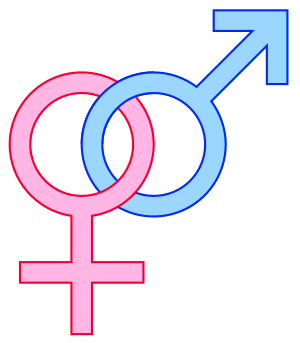Gender facts for kids
Gender means 'type'. It is a word commonly used for a person's sex (male or female). When people use the word gender in this way, it is often because sex has many other meanings, making it hard to understand.
Definitions and history
Before the 1950s, the term 'gender' was used only in the field of grammar. In 1955, a scientist began to use the word gender in new ways when referring to people, in a way that was related to their 'sex' but not quite the same.
Grammar
Before the 1950s, the term 'gender' was used only in the field of grammar, and only to distinguish a category of words that are called 'feminine nouns' from other words that are 'masculine nouns'. Many European languages that come from Latin like Spanish, French, and Italian have nouns that are either feminine or masculine in gender. For example, in Spanish, 'house' (casa) is feminine, and 'day' (día) is masculine. (Some languages have three genders, like German.) Outside of their grammatical category, the word 'gender' was not used to refer to people. At that time, when one spoke about someone being either 'male' or 'female', the word used was sex.
Social science
In 1955, the meaning of the word gender began to change. A scientist studying the similarities and differences between men and women began to use the word gender in new ways, that referred to people's behavior. John Money created the term gender role and began to use it to mean something different from sex.
In social sciences, there is a difference between 'sex' and 'gender':
- The word 'sex' describes the body. Sex organs and sex chromosomes show what sex someone is.
- The word 'gender' describes someone's personality or character. It says if someone feels or acts more like a female (feminine) or more like a male (masculine).
Related pages
Images for kids
-
Mary Frith ("Moll Cutpurse") scandalized 17th century society by wearing male clothing, smoking in public, and otherwise defying gender roles.
-
"Rosie the Riveter" was an iconic symbol of the American homefront in WWII and a departure from restrictive, "feminine", gender roles due to wartime necessity.
-
Spain's desperate situation when invaded by Napoleon enabled Agustina de Aragón to break into a closely guarded male preserve and become the only female professional officer in the Spanish Army of her time (and long afterwards).
See also
 In Spanish: Género (ciencias sociales) para niños
In Spanish: Género (ciencias sociales) para niños







